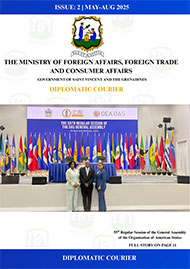Statement Delivered by Mr. Andreas Wickham
at the Plenary of the Eight Session of the WTO Ministerial Conference
Mr. Chairman
Ministers
Ambassadors
Ladies and Gentlemen
First let me join others in thanking the Government and People of Switzerland for the hospitality that they have shown and the arrangements that they have made in hosting this conference for the second consecutive session in Geneva.
Secondly Chair I would like to associate with the statements delivered St. Lucia and Antigua and Barbuda and those to be delivered by my colleagues from Grenada and St. Kitts and Nevis all of whom have emphasised various elements of the themes to be addressed in this conference as I will on the DDA negotiations.
When the Doha Development Agenda was launched at the Fourth Ministerial Conference we set out hope high maybe in retrospect too high, with the knowledge that development was at the heart Doha mandate and that a development outcome in each negotiating area was the raison d’être of the round.
For this reason Chair we are concerned at the current impasse. There is even more reason to be concerned, since it would that the first round of multilateral trade negotiations history of the multilateral trading system which could possible fail may be the round meant for developing countries. We are also deeply concerned at apparent attempts to weaken the development ambition of the DDA.
Mr. Chairman St. Vincent and the Grenadines and the rest of the OECS are not the cause of the current stalemate; neither do we hold the solution to moving the negotiations forward. We are too small and inconsequential in international trade terms for that to be the case.
Mr. Chairman it is however important for this conference to understand and appreciate we have individually and collectively invested significant human, financial and political capital over the last ten years, to identify and advance our trade and development interests in the DDA negotiations and therefore have great interest in the successful conclusion of the round in the shortest possible time. This is even more imperative within the current global economic crisis which has negatively impacted our countries.
In so many ways Mr. Chairman, we have been waiting on the sidelines for the bigger players to resolve their differences so that the talks can advance and we can once again seek to advance our interests and reap the promised development dividend of the round. We are growing tired of waiting and we call on key players to demonstrate the required leadership and political will, commensurate with their participation in global trade, to bring the negotiations out of the current doldrums and to arrive at the right balance of rights and obligations that reflects the varied levels of development within this organisation.
Recognising that what we need now from this conference is clear political guidance and direction and a precise roadmap for concluding the round, allow me to highlight our key perspectives on the way forward for the DDA.
First I wish to emphasise that my delegation sees the conclusion of the DDA as a total package. It is a package based on the Doha mandate and reaffirmed and reinforced at Hong Kong Ministerial and in the July Package. Furthermore it is a package containing different elements of a single undertaking. While we can accept an operationalisation of Doha paragraph 47 we cannot accept a breaking of the single undertaking. Any early harvest or early implementation must be linked to a clear identification of when and how the endgame for the remaining elements will be reached.
Secondly we wish to express caution in any exploration of new negotiating approaches in seeking to break the logjam. The current impasse is not one of process but of substance. It is imperative for small countries like ours that the fundamental negotiating principles of consensus, full participation, transparency, and inclusiveness are not undermined. All decisions in the negotiations must be made within the multilateral processes and our countries must immediately and fully benefit from all concessions granted in these multilateral negotiations.
Finally chair advances in the negotiations must build on progress already made. It is important for my delegation gains made by the SVEs, ACP and other groups in which we are a part are secured. I must also state that these do not represent the totality of our expectations in the round and we look forward to gains in pending areas in fisheries subsidies, the SSM, domestic regulations, special and differential treatment to name a few.
Thank you.



